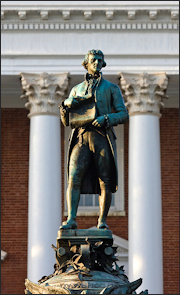I was proud of the University of Virginia last night.
The Young Americans for Freedom organized an event, “Defending Thomas Jefferson,” featuring National Review editor Rich Lowry and Texas Congressman Chip Roy, both UVa alumni. Organizers believe it was the first time that conservative speakers from outside the university had been invited since former Senator Rick Santorum had appeared four or five years ago. (It’s been so long that memories were hazy about the details).
Many posts on social media had been critical, and there were rumblings that a protest might be organized. But university police posted outside the Newcomb Hall lecture room provided security, and nothing remotely unpleasant occurred.
More than 150 people attended the event, which easily met expectations. What I found most encouraging was the healthy contingent of Black students who came to hear what the defenders of the university’s founder might say. One could deduce that many were not sympathetic to the views of the speakers because they sat silently through the applause lines. But they listened respectfully and, when the time came for questions, a number asked questions that were pointed but polite. (I am pleased to note that one Black student, who spoke with an African accent, said that she found Jefferson inspiring.)
The event was exactly what a great university should be doing — exposing students to different perspectives and facilitating the civil exchange of views. I am delighted that the Jefferson Council played a role in helping make it happen.
(View the Young America’s Foundation livestream on YouTube here.)
As for the substance of the presentations… Lowry made it clear that Jefferson is not memorialized because he was a slaveholder, he is memorialized despite the fact that he was a slaveholder. We put him on a pedestal for his achievements, which helped make America the country it is today.
If you revile Jefferson, Lowry asked the audience, why did you come to the university he founded? Why didn’t you go to James Madison University? Oops, Madison was a slaveholder. Why not George Mason University? Oops, Mason was a slaveholder? Why didn’t you go to Virginia Tech? (That was a laugh line.)
It was a valid rhetorical point but not likely to persuade anyone. More effectively, Lowry listed some of Jefferson’s accomplishments that moved the nation from a state of less freedom and equality to a condition of more freedom and equality, even if he did not end the institution of slavery.
- He wrote the preamble to the Declaration of Independence, including the immortal phrase declaring “life, liberty and the pursuit of happiness” to be universal human rights. In later years, that phrase became a cudgel against slavery and segregation.
- He wrote Virginia’s statute for religious freedom.
- As a Virginia legislator, he ended the feudal-era practices of entail and primogeniture, which perpetuated an aristocratic system of land ownership.
- He decried slavery as an evil institution, writing, “I tremble for my country when I reflect that God is just.”
- As a member of the Confederation Congress, he authored the 1784 Northwest Ordinance that would have ended slavery in the Northwest Territories (northwest of the Ohio River) had it not failed by a single vote.
- As president, he ended the U.S. participation in the Atlantic slave trade.
- After the egalitarian spirit of the American Revolution faded, a new generation of slaveholders arose in the South who argued that slavery was a positive good, not just for the slaveholders but the slaves themselves. They considered Jefferson’s words antithetical to their views.
It was a good list, and I learned some things I had not known. (T.J. proposed banning slavery in the Northwest territories? Who knew?) I would have explored only one other idea: If Jefferson deplored slavery, why didn’t he free his slaves? The answer: that was easier said than done. In one case slaves acquired from inheritance were bound legally by the conditions set by the inheritance. In another case, slaves served as collateral for Jefferson’s substantial debts. All laws encoding slavery were were unjust, but Jefferson could not break them with impunity.
Also, neither speaker addressed the Sally Hemings controversy but in passing. It is widely accepted by the public that four of Jefferson’s six children were born to his young slave, Hemings. Some of my compatriots at the Jefferson Council consider this a vile slander that remains unproven and unlikely. Frankly, I have not studied the matter in enough depth to have an informed opinion, so I shall evince no opinion. I simply note that the fraught question of Jefferson’s alleged “rape” of his slave concubine was never raised.
Congressman Roy took a different approach, tying Jefferson’s legacy of liberty to contemporary political issues. All humans are flawed, and Jefferson was no exception. He will be (or has been already) judged by God. We should not waste time defending Jefferson the man, Roy suggested. But we can embrace his ideas.
“We put our faith in principles, not princes,” said Roy. Jefferson’s words in the Declaration of Independence were his “timeless gift to humanity.”
The American system of government is broken, said Roy, and presidential actions are increasingly tyrannical. The principles of liberty and freedom are as relevant today as when Jefferson espoused them. “You’re never on the wrong side when you’re on the side of freedom.”
Note: The author serves as vice president-communications of The Jefferson Council.
